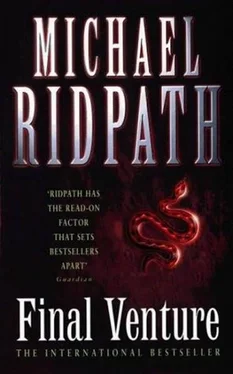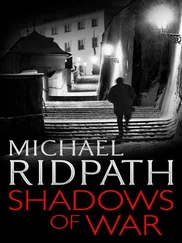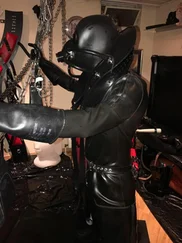I suddenly felt cold. Jail scared me. 'I wish I could prove I didn't do it.'
Phillips smiled. 'You don't need to. All we need to do is make sure there's a reasonable doubt that you're guilty.'
I stared out of the window at the gas stations and shopping malls. That's all you need to do, I thought. But a reasonable doubt wasn't good enough for me. I was innocent, and I needed everyone to know it. In particular, I needed Lisa to know it.
I watched myself on television that evening, along with the rest of Boston. And I saw Pamela Leyser being interviewed. She said she was confident of an arrest in the next few days. An Assistant District Attorney wouldn't say that unless she was pretty sure, I thought.
Gardner Phillips had said that if they arrested me, I would have to wait for the trial in jail. Presumably that would be a local jail with other remand prisoners. I could just about handle that, I thought, provided I was let go at the end. But what if I wasn't? What if they found me guilty and sent me to one of those high security jails for convicted murderers? American jails scared the hell out of me. I had seen the films, read the magazine articles. The privations of my Sandhurst training would be nothing compared with what I would experience there. In a community comprising gangs of murderers, where violence, drugs, rape and suicide were everyday occurrences, I would stick out as an easy target.
And if I was sent away, I'd spend what was left of my youth, and presumably the better part of my middle age, in prison. Everything I'd aspired to, everything I'd lived for, would be gone. Lisa, my career, all those experiences that life had yet to show me. Gone.
I went to bed alone and miserable, and for the first time in my life, afraid.
Daniel acted surprised to see me the next morning. 'So you escaped. Shouldn't you be heading off to Bolivia or somewhere? The cops in this country are pretty smart, you know. They'll probably find you here.'
'They let me go,' I said.
'Why?'
'Technical problems with the evidence. They don't have enough to arrest me.'
'So you're not cleared, then?'
'Far from it,' I sighed. 'I'm beginning to think I might end up in jail.'
'So what? You'll be fine. A big guy like you. You'll make a whole bunch of nice new friends.'
'Yeah,' I said. 'I'm worried, Daniel.'
For a moment, Daniel was serious too. 'I know,' he said. 'Good luck. I guess you need it.' Then he tossed across a copy of the Globe. 'Here, have you seen this?'
There I was, on page four. They had a picture of Frank. Police are receiving assistance with their investigation into the murder of Frank Cook from a man identified as Sir Simon Ayot, 29, a British national who was Mr Cook's son-in-law and his colleague at the venture capital firm of Revere Partners. The article was very light on detail and long on speculation.
It turned out Daniel wasn't the only one who had read the paper. After about half an hour my phone rang. It was Connie, telling me Gil wanted to see me.
He was sitting behind his large desk, the buildings of the Financial District standing tall behind him. He looked grim. Spread across his desk was a copy of the Globe.
'I heard you'd been released, but I didn't expect to see you back here so soon.'
'I've got a lot of work to do,' I said. 'It'll help take my mind off things.'
'This doesn't look good, Simon,' he said, nodding down to the paper in front of him. 'Not for you or for Revere. And I understand you were on the TV news last night.'
'That's true.'
'I called Gardner Phillips. I asked him whether he thought you were innocent.'
'What did he say?'
'He said he took pains not to consider the question.'
'He's a good lawyer.'
'I've asked you this before, but I have to ask you again. Are you?' He leaned forward over his desk, his eyes like small brown balls through his thick glasses.
'Innocent?'
'Yes.'
'Yes,' I said, meeting his eyes. 'I've never seen that gun before in my life. I didn't kill Frank.'
Gil sighed. He looked tired. 'OK. I have to trust my judgement. I'm going to stick by you and I'll make sure the rest of the firm does too. But do the best you can to keep our name out of the press.'
'Believe me, I will.'
'Good.' He waited for me to leave.
I did so with mixed emotions. On the one hand, his obvious doubts hurt. On the other, he had been good to me. Revere's public image was everything to him, and I had tarnished it. The evidence against me looked damning, but he had still stood up for me. He had put loyalty to his employees, his trust in me and his own instincts, before what was rationally in the best interests of the firm, namely to dump me. I was grateful. I didn't want to let him down.
After lunch, I finished the Investment Memorandum on Tetracom, and circulated it to the partners. Then I told John I would be out for the rest of the afternoon at a meeting, and took a cab back to the apartment. Lisa had a key to her father's house, which she kept in a small bowl above the fireplace. I took it, walked the few yards to the Brimmer Street Garage, and drove the Morgan out to Woodbridge to the scene of the crime.
Marsh House stood alone under a large sky of gathering rain clouds. A strong breeze blew in from the direction of the sea, flattening the marsh grass, and rocking the trees behind the house. Everything was more or less as it had been the last time I was there, the day Lisa and I had discovered Frank's body. Except for the Mercedes, which had disappeared, presumably taken by the police. They had finished their polishing and scraping, taken away their tape and left the house alone and empty. I wondered what Lisa would do with it. Would she keep it for its memories of life with her father, or sell it for its associations with his death?
I let myself in. I wore gloves. Whilst I assumed the police had finished their study of the place, I didn't want to add any unnecessary fingerprints for them to find later. I was nervous about coming here. The last thing I needed was for the police to find out I'd been here, and draw the wrong conclusions. But it was more dangerous to sit at home and do nothing.
The house was cold. It was dead quiet: even the grandfather clock that stood against the living-room wall was quiet, unwound. The imprisoned air had a musty smell to it, and a thin layer of grey film covered some of the surfaces. There were scrapings on the wooden floor where I had found Frank. Although the house looked natural, I had the feeling that everything had been picked up and carefully put down again.
Most of Frank's stuff was still there. Books, magazines, photographs of Lisa and Eddie, and even one of his wedding. There were two books on a table next to Frank's beaten-up rocker. A bird book by Roger Tory Peterson, and a book about the X-Files. Seascapes and prints of birds hung on the walls, as they always had done. I went over to his desk. This had been emptied. There were no papers left, no notebook or diary that might have given some clue of his thoughts before he died. Just a flower-patterned pencil box that Lisa had made for him when she was a girl, itself thinly covered in the grey-white sheen of dust. There was no sign of Revere.
I climbed the stairs. All the beds had been stripped. Once again, there was no paper in sight. Out of Frank's bedroom window, I could see the clouds thickening and darkening over the brooding marsh.
I tried to imagine what the house must have been like twenty years before, with the noise and bustle of a family on holiday. A small Lisa and a larger Eddie running up the stairs, playing on the porch, returning from an afternoon's swimming along the walkway across the marsh, hair wet, limbs tired, skin browned by the summer sun. But for the last fifteen years this had been Frank's sanctuary. The place where he liked to come alone as often as he could. It was a beautiful, peaceful spot. Why had he given up his family, I wondered. He loved his children. He seemed to at least like his wife. It was a mystery that had haunted Lisa, and one that I couldn't solve myself.
Читать дальше












